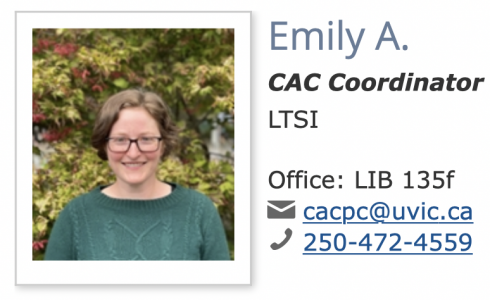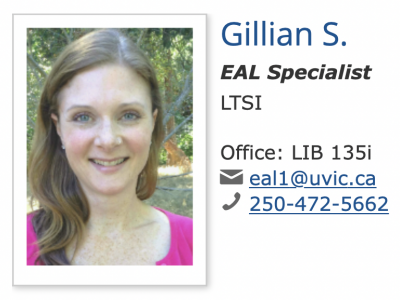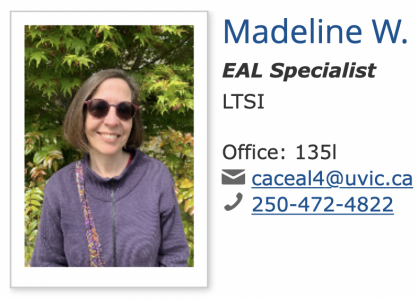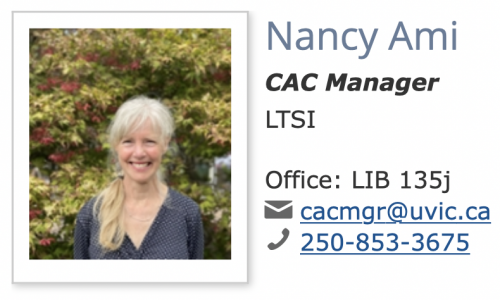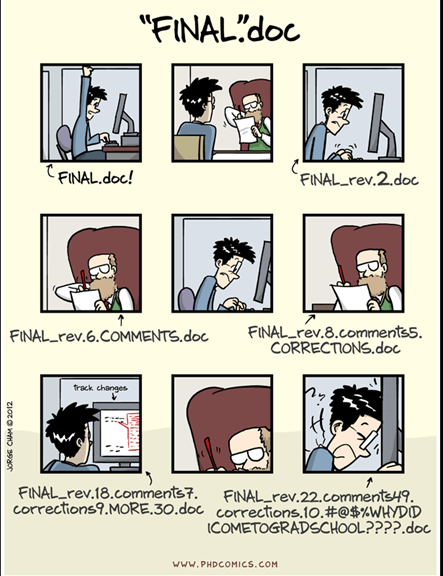September 14, 2022
By the CAC Team
Hello, returning and new graduate students. We know that graduate school involves lots of reading, writing, listening, and presentations. We offer one-to-one assistance with your academic writing challenges in three modes: Zoom appointments, in-person appointments at the Centre (in the Mearns Centre for Learning) and in the form of same-day written feedback. Create an account and make an appointment here: https://uvic.mywconline.com
As you embark on your courses and start researching and writing assignments, theses, and dissertations, we’d like to share our team members’ favourite writing resources. Perhaps one or more of these resources will provide knowledge or perspective that makes a difference to you.
Please leave a comment for us, letting us know your own favourites. We wish you well as you embark on your studies.
For graduate student writers
University of Minnesota “Graduate Student Writers” Resources:
The Center for Writing at the University of Minnesota boasts numerous “quick tips” resources for graduate student writers, including how to write thesis/dissertation/conference proposals, as well as how to organize, write, and present a thesis/dissertation, with specific emphasis on compositional cohesion and self-editing strategies:
For undergraduate student writers and for everyone
“EAL Learner Agency” WordPress Blog:
Below is a link to the WordPress blog I co-created with Jing Mao’s thoughtful input. The blog contains helpful information for EAL students on how to exercise greater learner agency by leveraging available academic supports as well as concrete tips for communicating effectively with course instructors and peers:
University of Minnesota “Student Resources” Site:
The University of Minnesota has produced a high-quality repository of resources for EAL learners including practical tips for improving speaking, listening, confidence, reading, writing, vocabulary, and grammar:
For graduate student writers
Writing Resources for Graduate Students (Yale University)
Yale University’s Graduate Writing Lab has a series of writing resources for graduate students on topics such as “Dissertation Writing” to “Prospectus Writing” that can help guide new graduate students navigate various forms of academic writing.
DoctoralWritingSIG Blog
From their own site: “DoctoralWritingSIG is a forum where people who are interested in doctoral writing can come together to share information, resources, ideas, dreams (perhaps even nightmares!) in a spirit of building knowledge and skills around higher degree research writing.”
For everyone
Purdue Owl
There are few students who do not know about this huge repository of information on general writing and grammar support. This is exactly why I make sure those few students also know about the Online Writing Lab at Purdue University.
Writing Advice (U of T)
A great collection of writing advice on fundamental questions about academic writing such as “how to overcome a writer’s block?” or “how to write an abstract?” These “advice files” are created by writing instructors at U of T based on the most common questions students have asked over the years and so cover a wide range of writing issues. The site is organized in a few categories, such as “Planning,” “Researching,” “Using Sources,” and so on.
Gillian’s favourite links
For graduate student writers
Carlton University’s Online Writing Resources for the Humanities and Social Sciences
Carlton University’s graduate writing resources page is home to a comprehensive repository of resources for writing, from guides on work-life balance and common problems in thesis and dissertation writing to video workshops and blogs like The Thesis Whisperer, Three Month Thesis, and more.
https://carleton.ca/gradpd/writing/humanities-and-social-sciences/
For undergraduate student writers and for everyone
English Use for Academic Purposes (EUFAP)
EUFAP is a long-time favourite, despite its somewhat basic and outdated appearance. It’s a site dedicated to everything related to English for Academic purposes (EAP), which is typically an area of instruction for English language learners, but this site really has information that can benefit writers of all backgrounds and skill levels. It addresses the “four skills”: reading, writing, listening, and speaking.
The University of Manchester’s Academic Phrasebank
The Academic Phrasebank provides the “nuts and bolts” of writing a research paper, organized by function. It’s a great resource for when you need to make a connection between ideas or argue a point and you’re at a loss for words.
Madeline’s favourite links
For graduate student writers
The thesis whisperer – salty language, tells it like it is, great information for students in the middle of a graduate degree.
Helen Sword hosts writing retreats and workshops that focus on enjoying academic writing, being productive, and writing with style. Her books are helpful as well, particularly, The Writer’s Diet and Stylish Academic Writing.
I also recommend her short video on nominalization – it’s fun and educational:
Pat Thompson’s website has fresh posts coming all the time about timely topics for grad students: how to write the literature review, how to start a doctorate, how to manage your time effectively, and much more.
Wendy Belcher is another writer on academic writing for grad students and faculty. Her writing advice webpage has links to some valuable material, such as how to write a journal article (she wrote the book on it!), how to write a book review, and how to read journals.
For undergraduate student writers and for everyone
I don’t know, maybe it’s the silly video with the guy playing a guitar and singing about transitions? Or maybe it’s because this is where I learned about “adversative transitions.” In any case, this is my go-to for transition information and suggestions.
https://blog.wordvice.com/common-transition-terms-used-in-academic-papers/
For overall grammar instruction, I refer students to Grammar Bytes because it’s light and fun. Additionally, the quizzes help to consolidate skills.
I like using our own CAC-created flowchart for article problems:
https://www.uvic.ca/learningandteaching/cac/assets/docs/cac-articles.pdf
Nancy’s favourite links
For everyone
Writing a location statement (positionality statement)
This 6-minute video provides a very helpful overview of what to include in a location statement:
https://www.youtube.com/watch?v=GpcIVzGYhVs&ab_channel=meganleanne44
Writing a literature review
Monash University offers some very helpful tips relating to literature review writing (if you’re OK navigating the “cookie” pop-up on your screen):
https://www.monash.edu/learnhq/write-like-a-pro/how-to-write…/literature-review
University of Sydney’s “The Write Site”
For a fantastic review of writing fundamentals, check out the nifty modules developed by the University of Sydney:
https://canvas.sydney.edu.au/courses/12076
